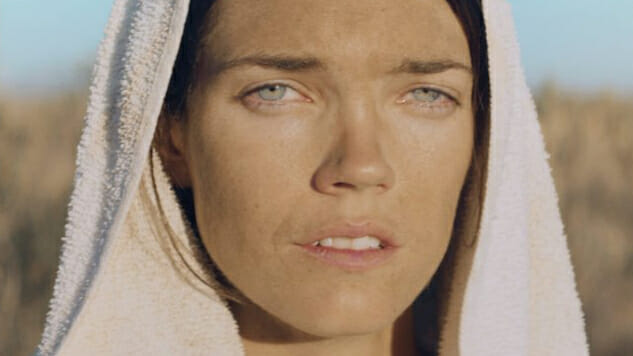Ma

In contemplating Celia Rowlson-Hall’s singular debut feature Ma, it is difficult to recall anything quite like it in movie history. Sure, there have been movies about dance, movies with dance sequences in them, and movies with stylized sequences in which actors move in a balletic manner. But an entire film that plays like a feature-length dance work, one reliant on body movements, costumes, sets and music to tell a story and explore its characters, with dialogue almost entirely absent? Not even Wim Wenders’ Pina, constructed out of a series of ballets rather than a single work, can boast that claim.
Rowlson-Hall’s audacity doesn’t just lie in its form, however. The jumping-off point for Ma is Biblical in nature, with Rowlson-Hall playing a variation on the Virgin Mary. In this modern update of her spiritual journey leading up to the birth of Jesus Christ, she traverses the desert landscape of the American Southwest on her way to Las Vegas, encountering a slew of characters on the way, including a blue-collar greaser type named Daniel (Andrew Pastides) who is the film’s equivalent of Joseph. Updating the Bible is a pretty gutsy move for any artist, but blasphemy is hardly on Rowlson-Hall’s agenda. Instead, the Virgin Mary becomes something of a feminist icon in Ma. Her journey here is as much about experimenting with conventional gender norms as it is about trying to remain pure and chaste in the eyes of God.
Surrounding Ma and Daniel are characters who appear meant to represent worldly temptations: Misti (Amy Seimetz), the sexy motel cashier who wears heels and comes on to Daniel; and a whole slew of macho archetypes—a policeman, a cowboy, a priest and so on—who figure both into a rape-fantasy dream sequence early in the film, and in a more literal scene later on that leads to a more empowering outcome. Ultimately, though, much of Ma’s conflict is internal. Rowlson-Hall’s wholly physical performance covers a startlingly wide emotional range, from childlike innocence to sexually charged eroticism to judgmental anger. Only once do those internal conflicts find an external expression: when, toward the end—just before she reaches the Vegas hotel in which she gives birth to Jesus Christ—she cuts her hair, steals some of Daniel’s clothes, and taps into her androgynous side. That moment, more than any other in the film, solidifies Ma’s feminist bona fides, its fluid play with gender.